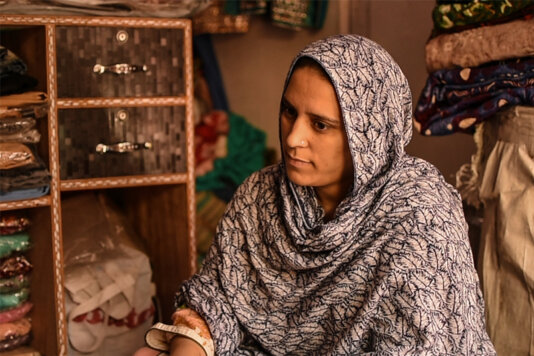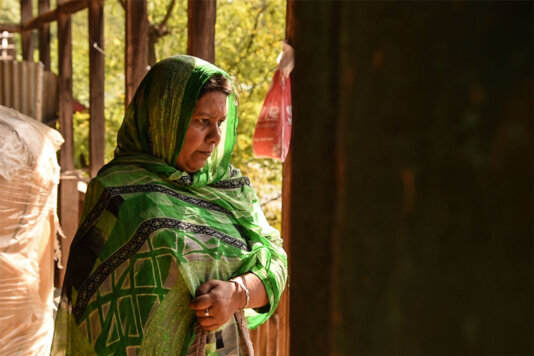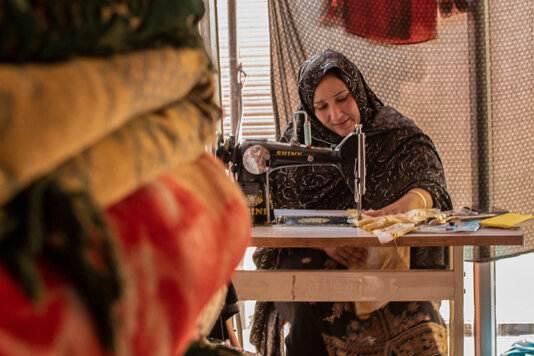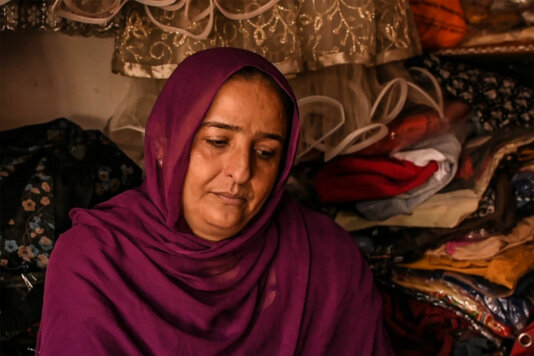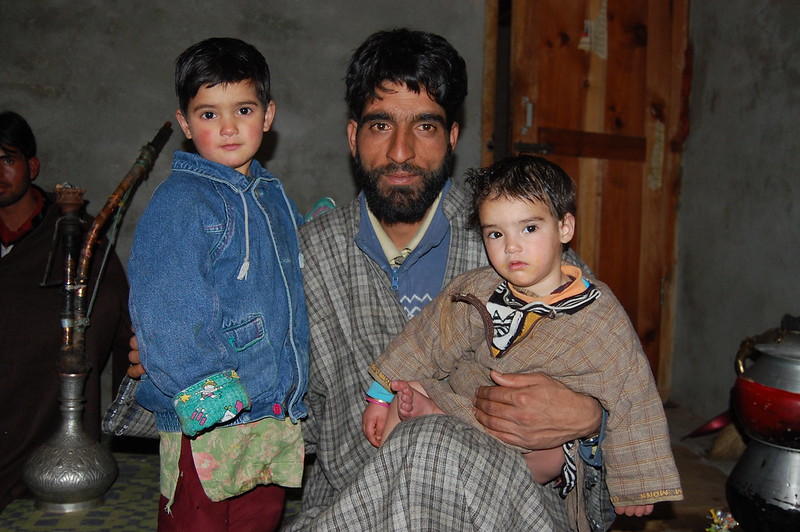- About
- Topics
- Story
- In-Depth
- Picks
- Opinion
- News
- Donate
- Signup for our newsletterOur Editors' Best Picks.Send
Read, Debate: Engage.
| May 17, 2022 | |
|---|---|
| topic: | Women's rights |
| tags: | #Kashmir, #statelessness, #Pakistan, #India |
| located: | India, Pakistan |
| by: | Suhail Bhat |
Shehnaz Bano is from Kotli in Pakistan-administered Kashmir, a city surrounded by mountains and lush greenery. When she and her Kashmiri husband arrived in the city of Qazigund in Indian-administered Kashmir 10 years prior, the surroundings were familiar - save the tumultuous political situation, which was about to change her life forever.
"I had an identity, a state, and rights in my hometown. However, I have no identity here, and I am not even treated as a human," she told FairPlanet.
Bano was unable to see her mother one last time before she passed away last year because she was not permitted to travel back home to Pakistan-administered Kashmir. "Not being able to see my mother's face one last time is the worst feeling a child can have," she said. "At the time, I wanted to cross the border to see my mother, but..." she lamented.
Her struggles did not end there, however. In the same year, Bano’s husband died, leaving her with two daughters and no one to support them. "I have been married for 20 years and have lived in Kashmir for the past 10. I am a young mother with two children. I requested from the government a visa or passport so that I could travel," she said.
Bano is one of hundreds of women who, along with their husbands, came to Kashmir as part of the government's rehabilitation policy in 2010, when tensions between the two arch rivals began to ease. The policy was designated for former militants from Jammu and Kashmir who had crossed into Pakistan-controlled Kashmir for arms training during the peak of the insurgency against India’s rule in the 1990’s but had since left militancy and were willing to return. The policy also stated that documentation would be provided to the wives and children.
The militants were asked to return and surrender via four specified routes: Chakan da Bagh in Poonch, Salamabad in Baramulla, Indira Gandhi International Airport in New Delhi, and Wagah in Punjab.
The majority of the militants, however, chose to return through Nepal in order to avoid being tracked by Pakistani security forces. Alas, New Delhi refused to approve Nepal as an official route despite repeated requests from then-Jammu and Kashmir Chief Minister Omar Abdullah.
Ultimately, the policy was not implemented, and these women and their families were effectively stranded in limbo. The Indian government denied around 400 families' requests to return to their homeland. This had put them in an odd situation where they lacked both an identity and a place to call home.
Kashmir has long been a source of contention between India and Pakistan. When an insurgency erupted in Indian-controlled Kashmir in the 1990s, thousands of men crossed the border to Pakistan for military training. The majority of them returned to the valley to fight the Indian army, while others stayed and married in Pakistan.
Once the women arrived in the Indian-administered region of Kashmir, problems began to arise, ranging from cold climate conditions to language barriers and a fragile political environment. They were in a completely foreign land. Their husbands struggled to find work and took odd jobs, becoming labourers and cab drivers, to make ends meet. Since the government considers them to be foreigners, they were denied citizenship.
According to Bushra Farooq, the rehabilitation policy destroyed her life as neither her family nor her husband, for whom she left her homeland, are with her. The Farooq never brought their Pakistani passports along with them, she claimed, adding that her husband tore them up in Nepal in the hopes of becoming an Indian citizen. "We were peacefully living [in Pakistan] when this policy was announced, and it completely destroyed our lives," she told FairPlanet.
Farooq claimed that out of all of the challenges they faced, not being able to see their families was the worst. "I had no idea what to do or who to call. We used to fight all the time about not being able to return to my home country. Because of the conflict, we broke up, and I have been working at a local boutique ever since.”
Worse still, her children are no longer with her. "They were with me at first, but [my husband] took them because children preferred him over me in a local Shariah Board," she lamented.
These women believe that the world has forgotten about them, saying that no human rights organisation has ever reached out to them and that no one seems to understand their plight.
They claim that they have pleaded with the government to fine them if they have made a mistake, to grant them civil rights in India or to allow them to return to their homeland, but to no avail. As far as they can tell, their lives are of no concern to the government and the international community.
"If they believe we entered the country illegally, why do they not fine us and deport us? We went to the Pakistani and Indian embassies, but no one listened to us," Nusrat, a woman from Muzaffar, told FairPlanet.
Some of these women, having been deserted by their husbands, are living as destitutes with no support.
Saira Javeed, a Pakistani woman from Lahore, married in 2001 and lived happily in Pakistan for seven years before relocating to Kashmir. She had assumed that she and her husband were only visiting for a short time and would return home later; that however, was not the case. "At the Delhi International Airport, my in-laws greeted us with joy. On the way, the family threw away all of our documents," she says.
Her dream of returning back to her homeland was about to be realised when an official promised to help obtain her travel details. "He got my passport and visa details and I took them to the Pakistani embassy for a new passport," she said.
But while her application was under review in the embassy, Javeed, along with her husband, were booked under the Foreigner’s Act, which restricts the entry and departure of foreigners and stipulates that the latter may be arrested, expelled or detained by the authorities. "My husband was incarcerated for six months," she said.
Her in-laws applied for Indian citizenship on her behalf 12 years later, but their request was denied due to “lack of proof” that Javeen was from another country. "I applied for a passport after the case was dismissed, but it was denied because I was considered a foreigner," she said.
These women claim that they want both countries' governments to treat their problem as a humanitarian issue and set their differences aside. They add, however, that despite their best efforts, their concerns have failed to pique the interest of the two countries, or the rest of the world for that matter, as their positions have not changed.
"The [Indian] government is deafeningly silent as if they are blind, dumb and deaf. In addition, the Indian government misled the Pakistani embassy by claiming that Pakistani wives of former militiamen would not be visiting Pakistan," Saira Javeed, an activist, told FairPlanet. "Why, then, did we stage a protest in Srinagar and Baramullaa, risking the wrath of the police? Why are they deceiving the Pakistani government? Despite the fact that our voices have reached a large number of people, the government in this country remains unmoved."
The future of these women's children is their greatest concern. They are unable to travel outside of the country for education or employment and their chances of fulfilling their dreams remain low.
"Our lives have been shattered now, but we want our children to live honourable lives. We are more worried about them now," Ambreena, another Pakistani woman, told FairPlanet.
They had given up hope of obtaining citizenship in India and wish to return to their families in Pakistan. They say they have been trapped in a never-ending cycle of despair and hopelessness. "If life continues like this," said Ambreena, "the majority of us will end their lives."
Image by Sameer Mushtaq.
By copying the embed code below, you agree to adhere to our republishing guidelines.

